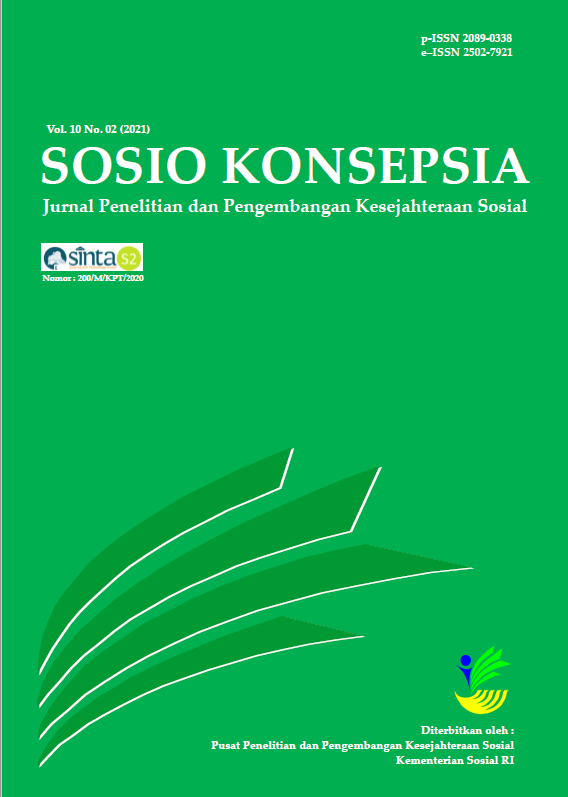Published 2021-04-30
How to Cite
Abstract
Â
Memenuhi kebutuhan ekonomi dengan bekerja di luar negeri agar mendapatkan uang adalah salah satu manfaat ekonomi yang dicari oleh seorang pekerja migran. Pekerja migran pun dilindungi melalui skema perlindungan sosial baik di negara asal maupun di negara tujuan seperti tercantum dalam UU No. 18 tahun 2017 tentang perlindungan pekerja migran pasal 31. Penelitian ini bertujuan untuk melihat bagaimana mekanisme perlindungan sosial pada Pekerja Migran Indonesia (PMI) Perempuan di Hongkong. Penelitian ini melibatkan 12 informan dari PMI Perempuan purna penempatan dan sedang dalam masa penempatan di Hongkong. Penelitian ini menemukan bahwa donasi antar sesama PMI dan pinjaman antar keluarga PMI merupakan mekanisme perlindungan sosial informal yang dibangun oleh PMI di Hongkong. Pada kondisi tertentu, cakupan perlindungan sosial formal tidak cukup untuk melindungi PMI Perempuan. Sebagaimana PMI perempuan memiliki hubungan pertemanan yang solid antar kelompok dan komunitasnya, skema perlindungan sosial informal dengan prinsip gotong royong membantu mereka ketika dalam kondisi sakit, pembehentian kerja, atau pun mengalami kecelakaan kerja.
Â
KATA KUNCI: Pekerja Migran Perempuan, Perlindungan Sosial, Perlindungan Sosial Informal
Â
Â
To fulfill the economic needs through working abroad in order to raise the wind is one of benefit seeks by the woman migrant workers. Migrant workers is protected with formal social protection schemes both in origin and destination countries as stipulated in UU No. 18 tahun 2017 about migrant workers protection article 31. This study aims to apprehend on how is the mechanism of social protection to Indonesian Women Migrant Workers in Hongkong. 12 informants were involved in this study from Indonesian women migrant workers post placement and in placement period. This study founds that donation and inter-family loan among Indonesian women migrant workers were informal social protection mechanism developed by them in Hongkong. In certain condition, the coverage of formal social protection is insufficient to to protect Indonesian women migrant workers. As woman migran workers have solid friendship relations among their group and communities, informal social protection schemes with gotong royong principle helped them when in illness, unemployment, and work injury.
Â
KEYWORDS: Woman Migrant Workers, Social Protection, Informal Social Protection  ÂDownloads
References
- Barrientos, A. (2010). Social Protection and Poverty. Geneva: UNRISD.
- BNP2TKI. (2020). bp2mi.go.id. Diambil kembali dari DATA PENEMPATAN DAN PERLINDUNGAN PMI: https://bp2mi.go.id/uploads/statistik/images/data_19-02-2020_Laporan_Pengolahan_Data_BNP2TKI____2019(2).pdf, diakses 16 Juni 2020.
- Calder, R., & Tanhchareun, T. (2014). Informal Social Protection: Social relations and cash transfer. Barton: Australian Government-Department of Foreign Affairs and Trade.
- Chan, C. (2014). Gendered Morality and Development Narratives: The Case of Female Labour Migration from Indonesia. Sustainability, 6(10), 6949–6972. MDPI AG. Retrieved from http://dx.doi.org/10.3390/su6106949.
- Dafuleya, G. (2018). (Non)state and (in)formal social protection in Africa: Focusing on burial societies. International Social Work, 61(1), 156–168. https://doi.org/10.1177/0020872815611196.
- Drolet, J. L. (2014). Social Protection and Social Development International Initiatives. New York: Springer.
- Hennebry, J. (2014). Falling through the cracks? Migrant workers and the Global Social Protection Floor. Global Social Policy, 14(3), 369–388. https://doi.org/10.1177/1468018114544765.
- Kusumawati, M. P. (2016). Nasib TKI di tengah Keberadaan Undang-Undang Nomor 39 tahun 2004. Jurnal Hukum Novelty, 155-167. http://dx.doi.org/10.26555/novelty.v7i2.a6296.
- Labour Department. (2014). Pedoman Praktis Untuk Pramuwisma Asing (Versi Bahasa Indonesia). Hongkong: The Government Logistics Department.
- Midgley, J. (2014). Social Development:Theory and Practice. London: SAGE Publication.
- Midgley, J., & Tang, K.-L. (2008). Social Security, The Economy and Development. New York: PALGRAVE MACMILLAN.
- Neuman, L. W. (2013). Metode Penelitian Sosial:Pendekatan Kualitatif dan Kuantitatif. Jakarta: Indeks.
- OECD. (2001). OECD-Towards ASIA's Sustainable Development-The Role of Social Protection. Paris: OECD.
- Olivier, M. (2018). Social Protection for Migrant Workers in ASEAN: Developments, Challenges, and Prospects. Bangkok: ILO.
- Platt, M. (2018). Migration, Moralities and Moratoriums: Female Labour Migrants and the Tensions of Protectionism in Indonesia, Asian Studies Review, 42:1, 89-106, DOI: 10.1080/10357823.2017.1408571.
- Republik Indonesia. (2018). Peraturan Menteri Ketenagakerjaan Nomor 18 Tahun 2018 tentang Jaminan Sosial Pekerja Migran Indonesia, Jakarta: Kementerian Ketengakerjaan
- PUSLITFO. (2019). DATA PENEMPATAN DAN PERLINDUNGAN PMI. Diambil kembali dari portal.bnp2tki.go.id: http://portal.bnp2tki.go.id/read/14229/Data-Penempatan-dan-Perlindungan-TKI-Periode-1-JANUARI-S.D-31-MARET-2019.html, diakses 18 April 2019.
- Ruparanganda, L., Ruparanganda, B., & Mupfanochiya, A. T. (2017). Traditional Social Security Systems in the Face of Urbanization: Lessons from a Rural Community in Buhera District of Zimbabwe. International Journal of Humanity and Science.
- Subadi, T. (2010). Tenaga Kerja Indonesia Di Malaysia (Studi Kasus TKW Asal Jawa Tengah dengan Pendekatan Fenomenologi). Forum Geografi, 155-172.
- Sumiyati. (2013). Perlindungan Hukum Bagi Pekerja Migran Indonesia Di Luar Negeri Akibat Pemutusan Hubungan Kerja Sepihak. Sigma-MU Vol. 5.
- Republik Indonesia. (2017) Undang-Undang Nomor 18 Tahun 2017 tentang Pelindungan Pekerja Migran Indonesia, Jakarta: Kementerian Ketenagakerjaan
- Woolcock, M., & Narayan, D. (2000). Social capital: Implications for development theory, research, and policy. Oxford University Press.





